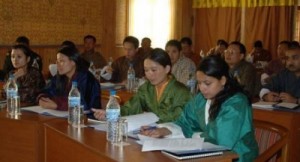Devising bio-security strategies
November 17, 2009: The country that reserves at least 60 percent of its total land for forests has started serious debate on protecting bio-diversity in the changing climatic conditions. The two-day national consultation workshop on devising strategies for bio-security ended in Thimphu today.
The workshop concentrated on extensive debate on Bio-security Policy of the Kingdom of Bhutan developed by the Food and Agriculture Organization (FAO) under Multi-donors Partnership Program (FMPP). The strategy document was approved by the government during the 15th session of the cabinet meeting on August 26, 2008.
In a statement, Ministry of Agriculture said, the workshop entitled “National Multi-stakeholders’ Consultative Workshop on Development of the National Bio-security Strategy” was called to enable and facilitate implementation of bio-security policy.
Dr. Elizabeth Ruth Frampton, the international expert on bio-security is the workshop facilitator who also developed the bio-security policy and country report for Bhutan.
Thirty-five participants representing various stakeholders from the Ministries of Health, Economic Affairs, Work and Human Settlement, Finance, Home and Cultural Affairs and Agriculture; National Environment Commission, Bhutan Chamber of Commerce and Industry, Food Corporation of Bhutan, Royal Society for Protection of Nature and Bhutan Agro Industries Limited attended the workshop.
The Bhutan Agriculture Food and Regulatory Authority (BAFRA) is the national competent authority to coordinate all bio-security-related activities in the country.
FAO under FAO-Norway Program Cooperation Agreement (PCA) identified Bhutan as one of the beneficiaries to assess its bio-security using the toolkit and develop action plan to strengthen the bio-security capacity in an integrated manner.
The strategy will streamline the effective coordination and communication mechanisms for implementation of various bio-security activities among the stakeholders. The strategy will be presented to the National Bio-security Commission for approval.

